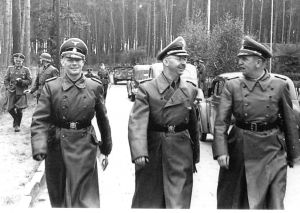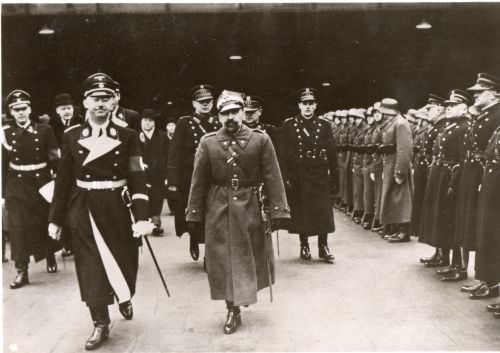Heinrich Himmler

Himmler (middle) visits the SSTraining Camp Debica – Voss (Right)
Heinrich Himmler was born in Munich on 7 October 1900. He was the son of a pious, authoritarian Roman Catholic schoolmaster who had once been tutor to the Bavarian Crown Prince. Himmler was educated at a secondary school in Landshut. He served as an officer cadet in the Eleventh Bavarian Regiment at the end of the First World War, later obtaining a diploma in agriculture from Munich Technical High School where he studied from 1918 to 1922.After working briefly as a salesman for a firm of fertilizer manufactures, the young Himmler joined a para-military, nationalist organisation and participated in the Munich Beer- Hall putsch of November 1923 as standard- bearer at the side of Ernst Rohm. Himmler served as secretary to Gregor Strasser and was his deputy district leader in Bavaria, Swabia, and the Palatinate and he was also acting propaganda leader of the Nazi Party from 1925 to 1930. After marrying in 1927, Himmler returned to poultry farming for a time but was singularly unsuccessful in the business of raising chickens. In January 1929 Himmler was appointed head of Htler's personal bodyguard, the black –shirted Schutzstaffel (SS), which at the time was a small force of some 200 men, which was subsequently to become under his leadership an all-embracing empire within the Nazi State.
Himmler was elected in 1930 to the Reichstag as Nazi deputy for Weser – Ems, Himmler concentrated on extending SS membership – which reached 52,000 by 1933 – and securing its independence from control by Rohm's SA, to which it was initially subordinated. Himmler organised the Security Service (SD) under Reinhard Heydrich. These two men ensured that the Nazis ensured that the Nazis consolidated their power within Bavaria in 1933.In March 1933 Himmler was appointed Munich Police President and shortly afterwards he became Commander of the political police throughout Bavaria. In September 1933 he was appointed Commander of all political police units outside Prussia and, though formally under Hermann Goering, became head of the Prussian Police and Gestapo on 20 April 1934.
The turning- point in Himmler's career was his masterminding of the purge of 30 June 1934 which broke the power of the SA and paved the way for the emergence of the SS as an independent organisation responsible for safeguarding the embodiment of the National Socialist idea and translating the racial goals from theory into brutal practice. By 17 June 1936 Himmler had successfully completed his bid to win control of the political and criminal police throughout the Third Reich, becoming head of the Gestapo in addition to his position as Reichsführer of the SS. Himmler was a very able organizer and administrator, meticulous, calculating and efficient and he possessed an amazing capacity for work and lust for power, manifested itself in his accumulation of official posts and his role in the development of organized State terrorism against all opponents of the Third Reich. In 1933 he had established the first concentration camp in Dachau, near Munich and in the next few years, with Hitler's encouragement greatly extended the range of persons who qualified for internment in the camps.

Heinrich Himmler before the Second World War in Warsaw.
Himmler's philosophical mysticism, his cranky obsession with mesmerism, the occult, herbal remedies and homeopathy went hand in hand with a narrow-minded fanatical racialism and commitment to the 'Aryan' myth.From the outset of his career as Reichsführer-SS, Himmler had introduced the principle of racial selection and special marriage laws which would ensure the systematic coupling of people of 'high value.' His promotion of illegitimacy by establishing the State-registered human stud farm known as Lebensborn, where young girls selected for their perfect Nordic traits could procreate with SS men and their offspring were better cared for than in maternity homes for married mothers, reflected Himmler's obsession with creating a race of 'supermen' by means of breeding. By the end of the 1930's the possibility of forging the Greater Germanic Reich of the future came close to realization as Himmler reached the peak of his power. In October 1939 Hitler appointed him Reichskommissar fur dieFestigung des Deutschen Volkstums (Reich Commissar for the Strengthening of Germandom) and he was given absolute control over the newly annexed slice of Poland. He was responsible for bringing people of German descent back from outside the Reich into its borders, he set out to replace Poles and Jews by Volksdeutsche from the Baltic lands and various outlying parts of Poland. Within a year over one million Poles and 300,000 Jews had been uprooted and driven eastwards. With the characteristic self-pitying and ascetic ethos of self-abnegation that he inculcated into the SS, Himmler informed the SS-Leibstandarte Adolf Hitler Regiment:
Gentlemen, it is much easier in many cases to go into combat with a company, than to suppress an obstructive population of low cultural level, or to carry out executions or to haul away people or to evict crying and hysterical women.
It was Himmler's master stroke that he succeeded in indoctrinating the SS with an apocalyptic 'idealism' beyond all guilt and responsibility, which rationalized mass murder as a form of martyrdom and harshness towards oneself. Nowhere was this more apparent than in Himmler's notorious speech on 4 October 1943 to the SS Group Leaders in Posen, today Poznan:
One principle must be absolute for the SS man: we must be honest, decent, loyal, and comradely to members of our own blood and to no one else. What happens to the Russians, what happens to the Czechs is a matter of utter indifference to me. Such good blood of our own kind as there may be among the nations we shall acquire for ourselves, if necessary by taking away the children and bringing them up among us. Whether the other people live in comfort or perish of hunger interests me only in so far as we need them as slaves for our Kultur. Whether or not 10,000 Russian women collapse from exhaustion while digging a tank ditch interests me only in so far as the tank ditch is completed for Germany. We shall never be rough or heartless where it is not necessary; that is clear. We Germans, who are the only people in the world who have a decent attitude to animals, will also adopt a decent attitude to these human animals, but it is a crime against our own blood to worry about them and to bring them ideals.
I shall speak to you here with all frankness of a very grave matter. Among ourselves it should be mentioned quite frankly and yet we will never speak of it publicly. I mean the evacuation of the Jews, the extermination of the Jewish people. Most of you know what it means to see a hundred corpses lying together, five hundred or a thousand. To have stuck it out and at the same time- apart from exceptions caused by human weakness – to have remained decent fellows, that is what has made us hard. This is a page of glory in our history which has never been written and shall never be written.
In carrying out his task as supreme overseer of the 'Final Solution' Himmler proved himself a fanatical disciple of race theory and an unswerving dedication to its translation into stark reality. By the time of the invasion of the Soviet Union in June 1941, all the necessary levers of power were in his hands. He controlled the Reich Main Security Office through Reinhard Heydrich and then Ernst Kaltenbrunner, the criminal police under Arthur Nebe, the Foreign Political Intelligence Service under Walter Schellenberg, and the Gestapo under Heinrich Muller. Through the SS he ruled supreme over the concentration camps and the extermination camps set up in Poland, as part of the Aktion Reinhardt mass murder programme. He also saw the development of the Waffen-SS, a powerful private army whose strength he had expanded from three to thirty five divisions, creating a real rival military force to the Wehrmacht.
In addition to these vast powers Himmler controlled the political administration in the Occupied Territories and in August 1943 he was made Minister of the Interior, giving him jurisdiction over the courts and the civil service. Himmler utilized these powers mercilessly to exploit the 'inferior' eastern peoples for slave labour, to gas millions of Jews on Hitler's orders, to plan mass abortions and the sterilization of entire ethnic groups. Under his authorization the SS medical services undertook pseudo-science experiments on criminals, concentration camp prisoners, gypsies and Jews, such the so-called 'freezing' experiments and high altitude tests in decompression chambers. Himmler who was disgusted at cruelty to animals was totally indifferent to the suffering of people used by the Nazis in this way.
Following the failed attack on Hitler on 20 July 1944 at the Führer's Headquarter's in Rastenburg, Himmler's position was strengthened still further and the Wehrmacht was forced to accept him as Commander-in –Chief of the Reserve Army, in addition to all his other offices. He was even given supreme command of the Army Group Vistula, in spite of his total lack of military experience. Towards the end of the war Himmler, however, became convinced that Germany was on the verge of total collapse and tried to approach the Allies for peace negotiations through the head of the Swedish Red Cross, Count Folke Bernadotte. He ordered the mass slaughter of Jews to be stopped on his own initiative and proposed the surrender of the German armies in the West, including Denmark and Norway, to General Eisenhower while continuing the struggle in the East against the Russians. Himmler, who by this time, had lost all sense of reality, evidently believed that the Allies would consider him an acceptable leader for a reconstituted Germany and even dreamed of setting up a National Socialist government in Schleswig- Holstein in May 1945 which would negotiate with the West on equal terms. Hitler, learning of the betrayal of his most loyal follower, was enraged, repudiating him in his political testament and stripping him of all his offices. Even Admiral Doenitz, who had succeeded Hitler, in the last days of the war, rejected Himmler's services. Following Germany's surrender, Himmler assumed a false identity, Heinrich Hitzinger, an ex-Sergeant of the Secret Field Police and on 10 May 1945 Himmler and a small group of trusted SS aides left Doenitz's Headquarters in Flensburg and drove southwards in four cars. They abandoned the cars and made their way on foot to Bremervorde, a town between Hamburg and Bremen, where they stayed at a farmhouse on Waldstrasse 165. Himmler was intercepted on the main street of Bremervorde, walking with Werner Grothmann and Heinz Macher. They were walking towards a check-point at the Oste River Bridge. They were interrogated and arrested at Wilhelm Lohse's mill, where they were kept overnight. Himmler committed suicide by swallowing a vial containing poison at the British Security Force Headquarters at Uelzener Strasse 31a in Luneberg.He was buried in an unmarked grave.
Sources:
Robert Wistrich, Who's Who in Nazi Germany, Routledge, London 1995
Himmler's Suicide – After the Battle - Issue 14 1976
Photographs – Chris Webb Archive
© Holocaust Historical Society - November 9, 2024



